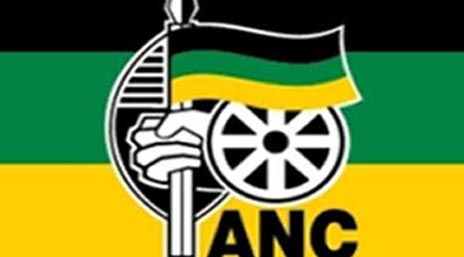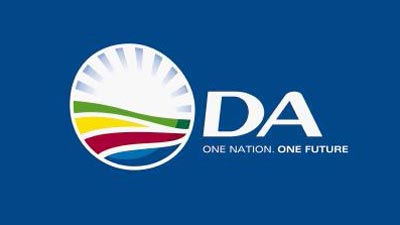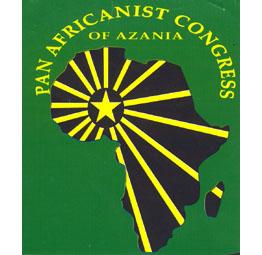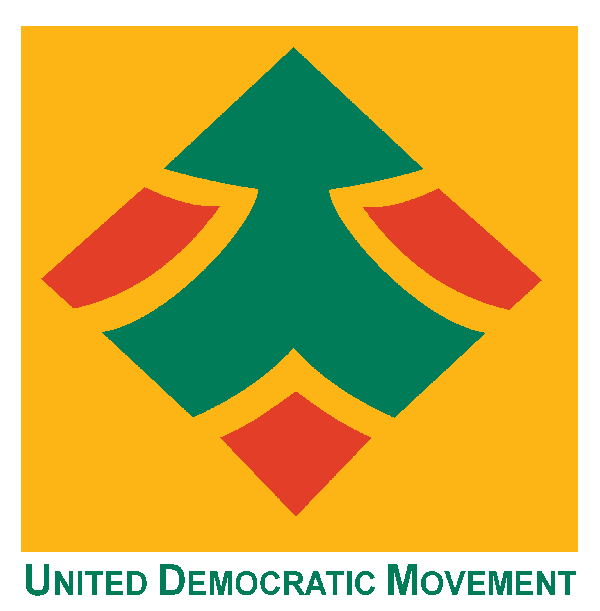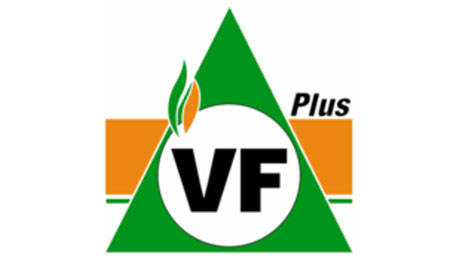10 SA Political Parties And Their Agendas Compared
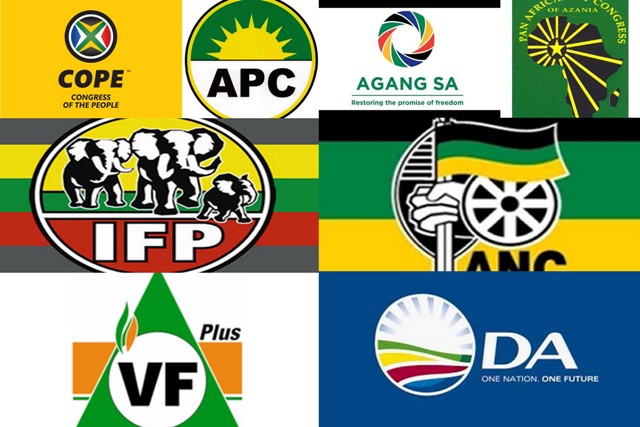
South African politics have been on a high especially since the recent elections, the birth of the EFF and their behaviour in parliament and the fearless Thuli Madonsela protecting the public. The following list takes a look at the political parties in South Africa, their agendas and what they consider to a priority in South Africa. Through research, and one finds that whereas some have similar agendas, others have opposite views and agendas for the country. Votes speak loudest at the end of the day, because it’s what you promise and produce that ultimately gives you rulership over the country. Although having it in writing is good, actions are what matter most. Words are just that, words but its actions that create change.
1. ANC – African National Congress
The ANC is the Republic of South Africa’s governing political party, supported by its Tripartite Alliance with the Congress of South African Trade Unions (COSATU) and the South African Communist Party (SACP), since the establishment of multi-racial democracy in April 1994. It defines itself as a “disciplined force of the left”. Members founded the organisation as the South African Native National Congress (SANNC) on 8 January 1912 at the Waaihoek Wesleyan Church in Bloemfontein to increase the rights of the black South African population.
Agendas…
To build an inclusive economy that creates jobs – Establish capacity in the state to do long-term planning, drawing where necessary on expertise that exists in wider society.
To transform our rural areas – Implement rural development focusing on meeting basic needs, land reform and rural enterprise development, supported by localised markets, credit facilities and economic infrastructure.
To fight corruption and crime – Intensify the fight against corruption in both the public and private sectors through measures to restrict public servants from doing business and holding public officials individually liable for losses arising from corrupt actions.
2. DA – Democratic Alliance
The Democratic Alliance (DA) is a South African political party and has been the official opposition at national level since the 1999 general election. It has also been the governing party of the Western Cape Province since the 2009 general election. The DA is broadly centrist, though it has been attributed both centre-left and centre-right policies. The party is consequently a member of the Liberal International and the Africa Liberal Network.
Agendas:
Safety, Justice, Correctional Services – In the DA’s vision of an Open Opportunity Society for All, children are safe from harm and citizens are able to walk in our cities and townships without fear.
Housing Policy – The DA believes that every South African family should have access to adequate shelter and supports the interpretation of section 26 of the constitution which requires that this right must be ‘progressively realised’.
Governance Policy – Every effort of government must be focused on improving the lives of South Africans.
3. EFF – Economic Freedom Fighters
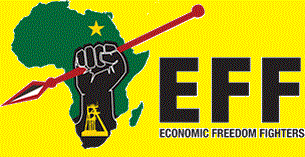
The Economic Freedom Fighters (EFF) is a South African political party started by expelled former African National Congress Youth League (ANCYL) president Julius Malema, and his allies, in 2013. Malema is “commander in chief” of the EFF, heading the “Central Command Team” which serves as the central structure of the party.
Agendas…
Expropriation of land without compensation for equitable redistribution. – The EFF’s approach to land expropriation without occupation is that all land should be transferred to the ownership and custodianship of the state in a similar way that all mineral and petroleum resources were transferred to the ownership and custodianship of the state through the Minerals and Petroleum Resources Development Act (MPRDA) of 2002.
Nationalisation of mines, banks and other strategic sectors of the economy. – Owing to the character of the South African economy and the aspirations of the people for economic freedom, state ownership and control of strategic sectors of the economy should be the foundation for sustainable economic transformation in South Africa.
Free quality education, healthcare, houses, and sanitation. – Education will be free up to undergraduate level and all pupils and students will be provided with adequate learning and teacher-support materials.
4. PAC – Pan Africanist Congress
The Pan Africanist Congress of Azania (once known as the Pan Africanist Congress, abbreviated as the PAC) is a South African Black Nationalist movement, and is now a political party. It was founded by an Africanist group with the African National Congress, including Robert Sobukwe.
Agendas…
Right to Shape Own Destiny – To the African people there can be no room in any way or in any part of Africa for any non-indigenous peoples who deny to the indigenous populations their fundamental right to control their own materials and spiritual interests effectively, South Africa, witch is an integral part of the continent, is the inalienable heritage of the African people and its effective control is their undoubted and unquestionable birthright.
One Race – They recognise no inescapable fundamental differences among members of even the three main branches of that race.
Social Relations – To live in harmony with his fellowmen, man must recognise the primacy of the material and spiritual interest of his fellowmen, uphold his won interests at the expense of those of his fellowmen.
5. IFP – Inkatha Freedom Party
The Inkatha Freedom Party (IFP) is a political party that has been led by Mangosuthu Buthelezi since it was founded. It is currently down to the fourth largest party in the National Assembly of South Africa, having lost almost half its seats and votes in the 2014 general election and yielding third place to the newly formed Economic Freedom Fighters.
Agendas…
Women’s issues – The IFP is committed to ensuring that South African women achieve a position of substantial parity with their male counterparts in each of society’s building blocks.
Public service and administration – In transforming and reforming the Public Service, it is vital that the process be guided by a clear, comprehensive and commonly accepted vision of the fundamental principles that should shape the new Public Service.
Labour – IFP Labour Policy advocates the introduction of further tax incentives in order to stimulate employment growth, and minimal interference by government in business-labour relations.
6. UDM – United democratic Movement
The United Democratic Movement (UDM) is a centre-left, social-democratic, South African political party, formed by a prominent former National Party leader, Roelf Meyer (who has since resigned from the UDM), a former African National Congress and Transkei homeland leader, General Bantu Holomisa, and a former ANC Executive Committee member, John Taylor. It has an anti-separatist, pro-diversity platform; and supports an individualist South Africa with a strong moral sense, in both social and economic senses.
Agendas…
Trade and industry – The policy on Trade and Industry aims to fulfil its aim of job creation with a vigorous programme to encourage Small Business Development.
Education – To develop and maintain an Education system that produces school-leavers and graduates that are equipped with balanced job-related and life-skills to enter the job-market, economy and greater society and be productive and responsible citizens.
Foreign Affairs – UDM Foreign policy aims to productively engage with the peoples of the world to improve the prospects for peace, cultural enrichment and economic well being of people at home and abroad.
7. COPE – Congress of The People
The Congress of the People (COPE) is a South African political party formed in 2008 by former members of the African National Congress (ANC). The party was founded by former ANC members Mosiuoa Lekota, Mbhazima Shilowa and Mluleki George to contest the 2009 general election. The party was announced following a national convention held in Sandton on 1 November 2008, and was founded at a congress held in Bloemfontein on 16 December 2008. The name echoes the 1955 Congress of the People at which the Freedom Charter was adopted by the ANC and other parties, a name strongly contested by the ANC in a legal move dismissed by the Pretoria High Court.
Agendas…
To relieve poverty; to create jobs and other appropriate income earning opportunities; to protect our people from crime; to advance citizen participation in all spheres of public endeavour;
To encourage free, and ethical economic activity upholding transparent and arms-length relations between political and business interests;
To advance research and development, science and industry in order to be competitive and enable economic growth as well as development and the equitable distribution of the benefits of economic growth.
8. AGANG
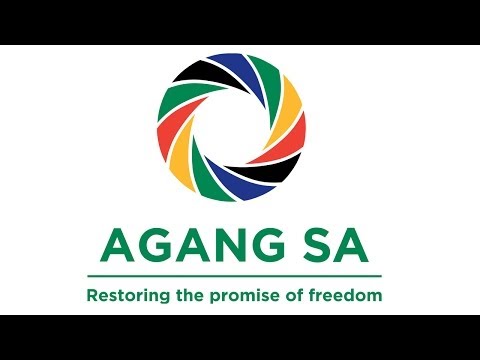
Agang South Africa is a South African political party, formed by anti-apartheid activist Mamphela Ramphele on 18 February 2013. There however is uncertainty of the actual date of when the party was founded as their site claims that it was founded on the 22 June 2013, which was the date of the party’s first official congress.
Agendas…
Changing from the current system of proportional representation and party lists to a system of constituency-based representation, which South Africa had before 1994
Increasing salaries of public servants
Reducing employment in mining and agriculture, through modernisation, and increasing employment in the service sector.
9. APC – Pan African People Convention
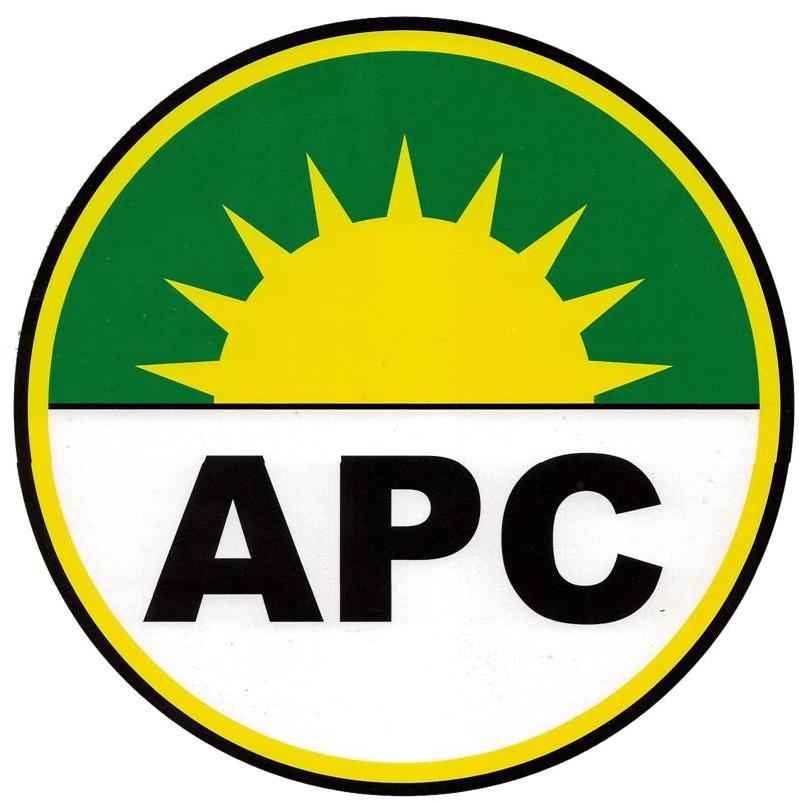
The African People’s Convention (APC) was founded on the 5th September 2007, precisely to fill the political void that existed since the advent of Democracy in 1994. It was formed to be the alternative Voice, the voice of the voiceless. The voice that will never betray the revolution, but will advance it to ensure that freedom and democracy have material meaning to all the citizens of the Country. The Party of the left, the Party that is steeped firmly on the values and traditions of the liberation movement.
Agendas…
Rally to defend and advance the right to national self determination.
Strive for Africanist Socialist Democracy.
Promote the ideal of unifying Africa and the African Diaspora.
10. FF Plus – Freedom Front Plus
The Freedom Front Plus (FF+; Afrikaans: Vryheidsfront Plus, VF+) is a national South African political party formed in 1994 and led by Dr. Pieter Mulder. Current policy positions include amending affirmative action and land reform to protect the interests of white South Africans and Coloureds.
Agendas…
Defeat the ANC through coalition politics (FF Plus can govern together with other opposition parties in Gauteng);
Stop policies and legislation which hamper job-creation;
Stop racial discrimination;

